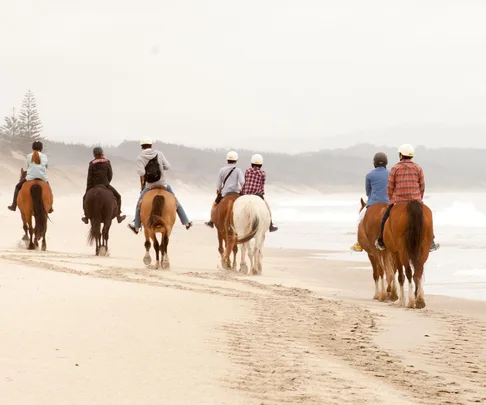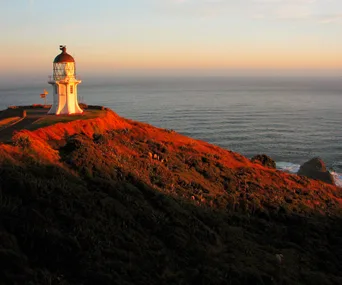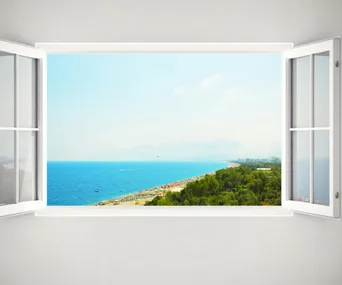Fraggle, the Haddons’ pet magpie, was a formidable bird that swore like a trooper and had a discerning taste in men. Gay ones she left alone. The rest she terrorised mercilessly and woe betide an ankle carelessly left exposed.
Dad was doomed the minute he crossed her path. She took to him at once; I can still hear the squawks as he danced across the paddock, hopping from foot to foot, with Fraggle in hot pursuit.
I remember, too, the fierce blueness of the sky, the sunburnt grass, the shimmering heat of that first summer we went horse riding at Sharley and Laly Haddons’ place, at Pakiri Beach in Northland. I was in my 20s. The sand was as white as bleached bones, the waves spitting gobs of froth. A trail of hoofprints criss-crossed the dunes.
My sister and I stayed on, in a little cabin up a short track from the sea. One morning, sunbathing on the sand, I glanced up from my book to see a middle-aged couple walking by the water, knapsacks slung over one shoulder, their skin a leathery nut-brown. It was only when I looked up again I noticed both were stark naked.
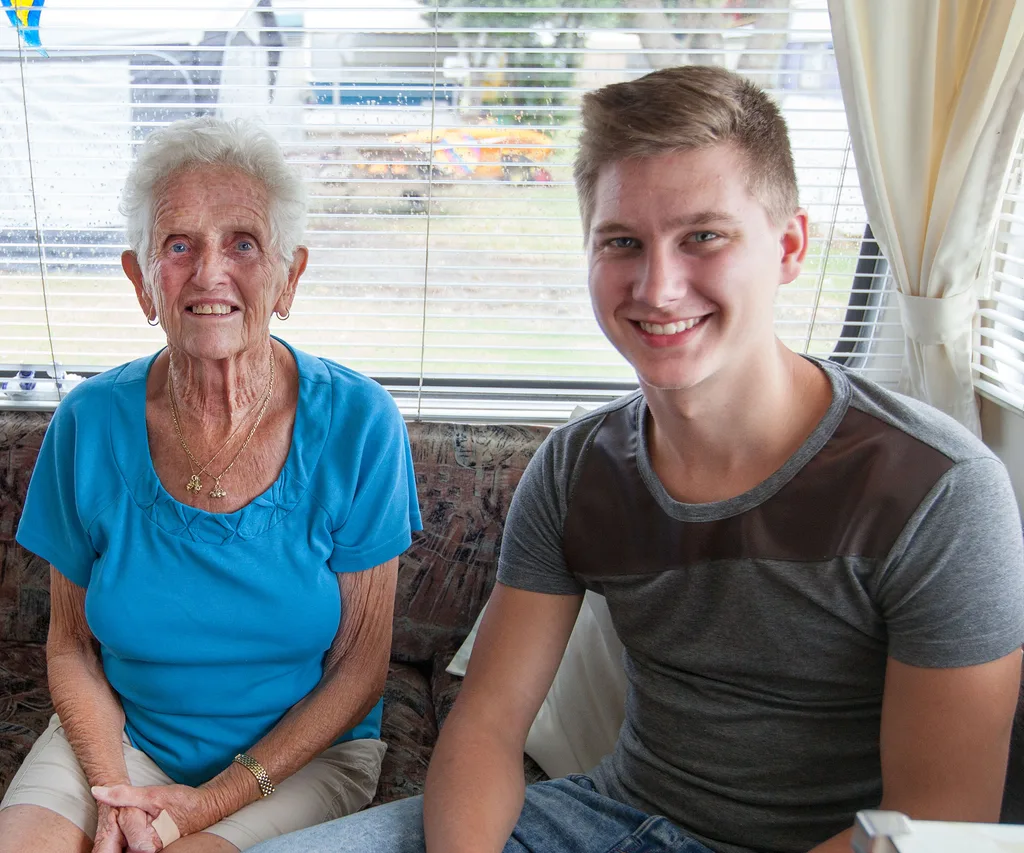
Ruud van Brussel with his great aunt, Jo Hayden, in her caravan at Pakiri Beach Holiday Park. “Nana Jo” – as she’s known at the campground – has spent summer here with her family for the past 46 years.
We’d stumbled across Pakiri in the late 1980s, when my father retired nearby to Sandspit. A former judge, Dad didn’t have much truck with “rabble-rousing Maoris”. But he struck up an unlikely connection with Laly, who had equally firm views on how to put the world to rights.
Both had great respect for history and tradition. Laly’s ancestors gave Pakiri its name – his great-grandmother was Rahui Te Kiri, whose people were forced off Little Barrier Island (Hauturu) in 1894 after the government claimed it as Crown land to create a nature reserve. The first time they took Rahui, she jumped ship and swam back.
A former Maori All Black, Laly was at Parliament for the signing of the Treaty settlement in 2011 that returned Little Barrier to Ngati Manuhiri (who then gifted it back). It wasn’t the only land grab he fought through the courts, campaigning against the controversial dredging of sand from Pakiri to cushion the backsides of city folk in Mission Bay and Pt Chevalier.
I’d lost touch with the Haddons years ago, after Dad moved away. But when I dipped down the valley into Pakiri, its unruly farmland tumbling out to the sea, a wave of nostalgia thumped into my chest.
It took me a moment to recognise Sharley when I dropped by to collect my key for a weekend in that same little cabin in the dunes. Her hair was shot with gray, and a different dog curled by her feet. We sat in the sun by the farmhouse, where Laly and my father once sparred at the dinner table. How was it possible, I asked her, that they had never come to blows? “They were both strong men,” she said, simply. “They recognised the value of each other.”
My father went first, in his late 80s. Laly followed a year later, dying of cancer in 2013, at the age of 74. More than a thousand people came to his tangi. Fraggle, the cussing magpie, who’d slept on a towel rail in the Haddons’ bathroom and woken them each morning by gently tugging on their eyelashes, was an old memory by then. Sharley was a teenager when she met Laly. Next year, she turns 70. “I fell in love with him the day I met him and I loved him till the day he dropped.”
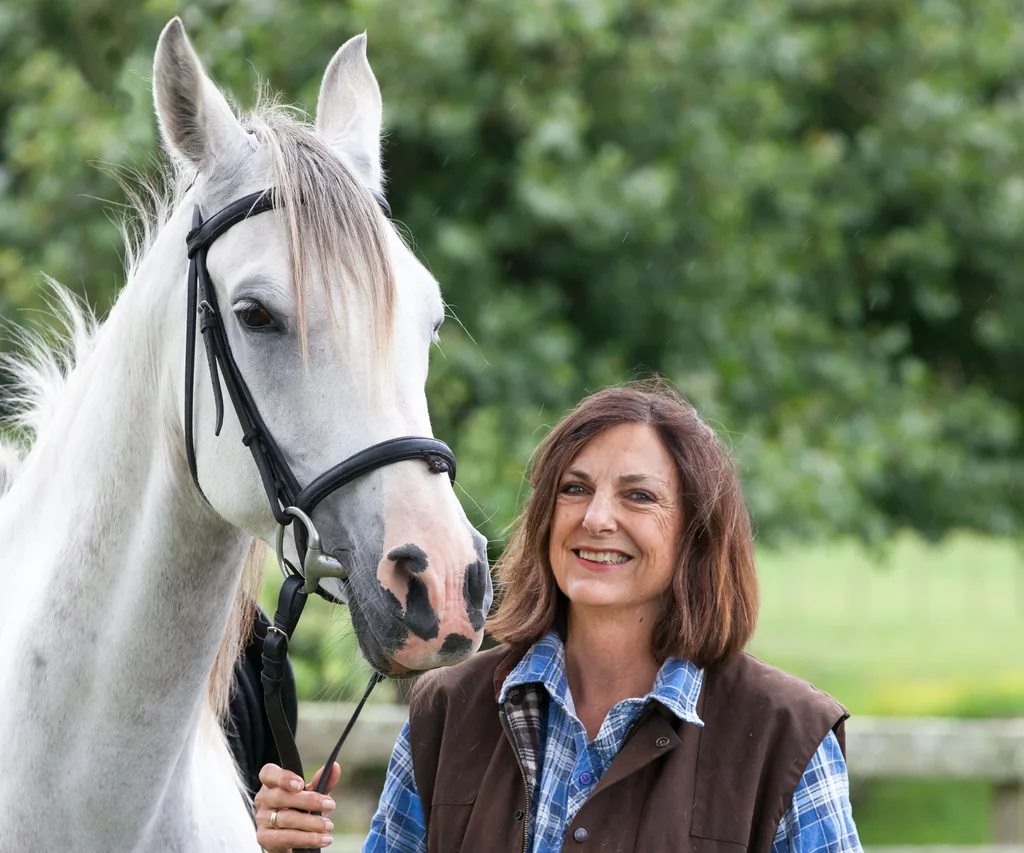
Sharley Haddon has loved Arabian horses since she first saw them in the desert in Morocco in the 1970s. She runs an Arabian stud at her family farm, where you can book a horse trek or a bed for the night through Pakiri Beach Horse Rides.
It’s all beef and sheep around Pakiri now, but this used to be dairying land once. In the 1980s, Sharley ran an Arabian stud on the side. When the recession dug in, Laly told her to get rid of the horses. She decided to make them pay their way, instead. These days, she has more than a hundred in her paddocks, from purebreds to trekkers. International tourists make up at least half of her business. A few years ago, she spotted a young Dutch traveller in Dubai wearing one of her “Pakiri Beach Horse Rides” T-shirts.
Apart from the campground, which has a small shop, it’s pretty much the only business in town. The nearest supermarket is Nosh, a gourmet deli, back over the hill in Matakana. Omaha, with its golf carts and concrete cul-de-sacs, is a half-hour drive away. Here, there’s just 14km of beach, a bird sanctuary, and a line that’s been drawn in the sand.
In 2005, the Auckland Regional Council bought two blocks in Pakiri for $19 million to create a regional park, protecting a stretch of prime coastal real estate from subdivision and development. (One was the “Tuaman Inc” property, sold off to pay legal bills after boxer David Tua’s bitter fallout with his managers.) Much of what’s left is whanau land; handed down through the generations.
Like small rural communities across New Zealand, Pakiri sheds its young. What keeps it alive is how many are drawn back. “It takes a hold over people,” said Sharley, whose son came home from Western Australia, where he was running a shearing gang, to take over the family farm when his father got sick. Now his own kids are heading off down the road to Pakiri School. Another couple moved back from Australia with their two young girls before Christmas, bringing the school roll to 17.
Principal Natasha Greatorex came to Pakiri from Mangawhai, another small coastal school. She watches as the single classroom emptied out for morning break, bare feet skimming across the field. “They don’t sit inside at the weekend on Playstation,” she said. “They’re outside children – out there within the community. They know what’s around them.”
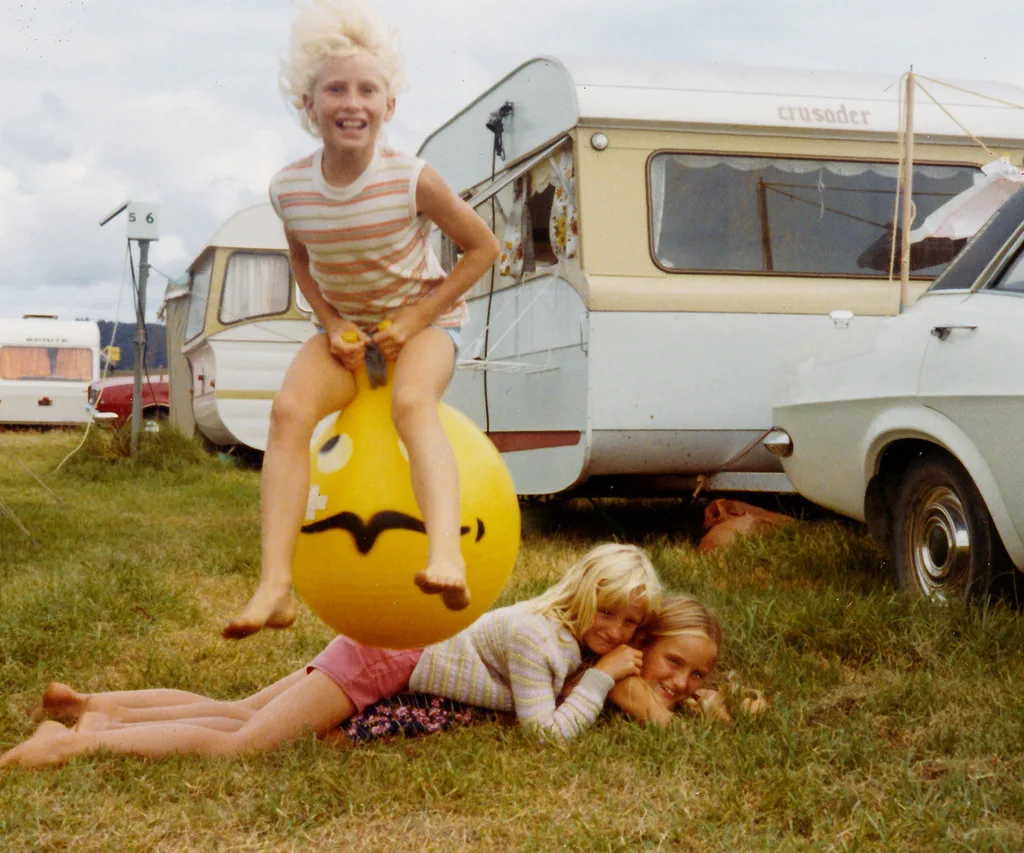
An old photograph of Jo Hayden’s two daughters and a friend, taken in the early 1960s.
Many are the second or third generation in their family who’ve come to the school, before drifting away to college. The old schoolhouse, with its original chalkboards, is used as a library. “They can see [photographs of] their mums in the kapa haka uniform when they were young and the rompers they wore for sports.”
Ruby Cooper’s grandmother used to walk the 3km to school, down the beach and over a footbridge across the inlet (“I was wild,” she told me, later). She still lives in the house where she raised her own five kids, looking out over the water to Little Barrier, her ancestral home. “Babes,” Greatorex called out to a long-legged streak of a kid, “how old is your nana?”
The eldest of four, Ruby is mad about sports and loves surfing. “My aunties and cousins virtually live at the beach.” Her dad works in Wellsford and sometimes she goes shopping in Auckland with her mum. “It’s very big and noisy,” she said.
I thought it must be one of the smallest schools in New Zealand. Possibly the smallest in Rodney, Greatorex said. “Every school around this district is absolutely different and serves the community that it’s within.” What made Pakiri special? She thought for a minute. “Unity. The value of unity. Everyone works together to do the best for their community and the best for their children.”
Jobs are scarce in remote settlements like this. The houses aren’t flash. People pick up work here and there when they can. But last year, the annual quiz night raised $7000 for the school. Next door, the public tennis courts have just been resurfaced. A bit of a do was put on at the hall across the road to mark the official opening.
A lovely old Methodist church, built in 1926 and gifted to the community, has been re-piled, repainted, and the rimu weatherboards replaced – all with donated money and labour. Stephen Ruck, chairman of the Pakiri Church Trust, reckoned close to $80,000 had been raised so far. The inside still needed doing, the path and front fence. A new back door was on its way.
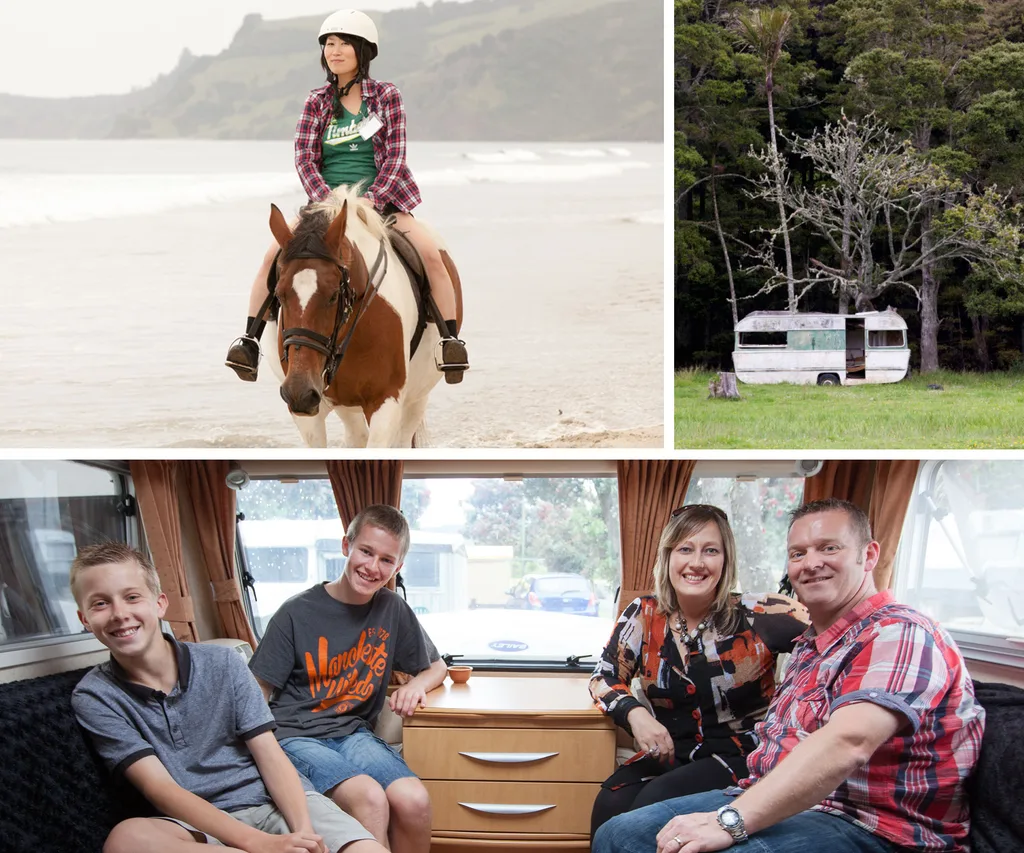
Above: Japanese tourist Karde Fukushima on a horse trek along Pakiri Beach. Above right: An abandoned caravan parked up in a paddock. Bottom: Darren and Helen Shaw with their two boys, Harry and Connor, at Pakiri campground. The family moved to New Zealand four years ago from the Lakes District in England. Their caravan is kept in mint condition, its paintwork polished to a gleaming sheen. “You feel like you’re on holiday every weekend, don’t you?” said Darren.
Ruck laughed when I asked if he was a local. He’d bought a block of Pakiri land at auction in the early 1990s and moved up from Auckland. “Quite a newcomer!” He’d married a local, though – his wife is Laly Haddon’s cousin. It still gets him every time, when the road dips into the valley and there’s the sea, unfurling into the distance. “People come here because of the kind of place it is,” he said. “The ones who want to change it aren’t very well received.”
Ruby Cooper’s grandmother, Nana Tilly, is 67. I knocked at her door unannounced and she didn’t have her teeth in. “But that’s all right, eh?” she said, putting on the kettle. Laly Haddon, it turned out, was her brother. There he was, in a photo of the Maori All Blacks team that toured the Pacific Islands in 1973. There was Rahui Te Kiri, their fierce grandmother, and Tenetahi, the great seaman who was her husband. There was Winston Peters, smiling from another framed photograph on the wall.
“Cousins,” Tilly said. “We love Winston here.” But that family portrait of the Obamas – surely she wasn’t related to them? “You never know! We’ve got American, Jewish and Irish blood, too.”
Tilly, an artist in her own right, was married to the illustrator Peter Gossage. Last year, their daughter, Star, won an Arts Foundation New Generation Award. Back down the drive, I found Star in her studio, working on an installation for the Auckland Arts Festival in March. Her sister, Pa, had dropped in with her baby to finish off some children’s books for the marae. “You never get lonely,” said Star. “The whole road is all our relations!”
I’d met her daughter, Grace, that morning at Pakiri School. She’s been riding horses at her Aunty Sharley’s place since she was three. “It’s the best place for kids to grow up, running from one house to the next through the paddocks,” said Star. “Just real free. Heaps of space. As soon as you come over the hill, it’s like going back into a different realm.”
Imagine what it must have been like for Jo Hayden when she first came to Pakiri. Born in inland Holland, she’d never seen the sea until she was 16. She’s almost 80 now and has still never learnt to swim.
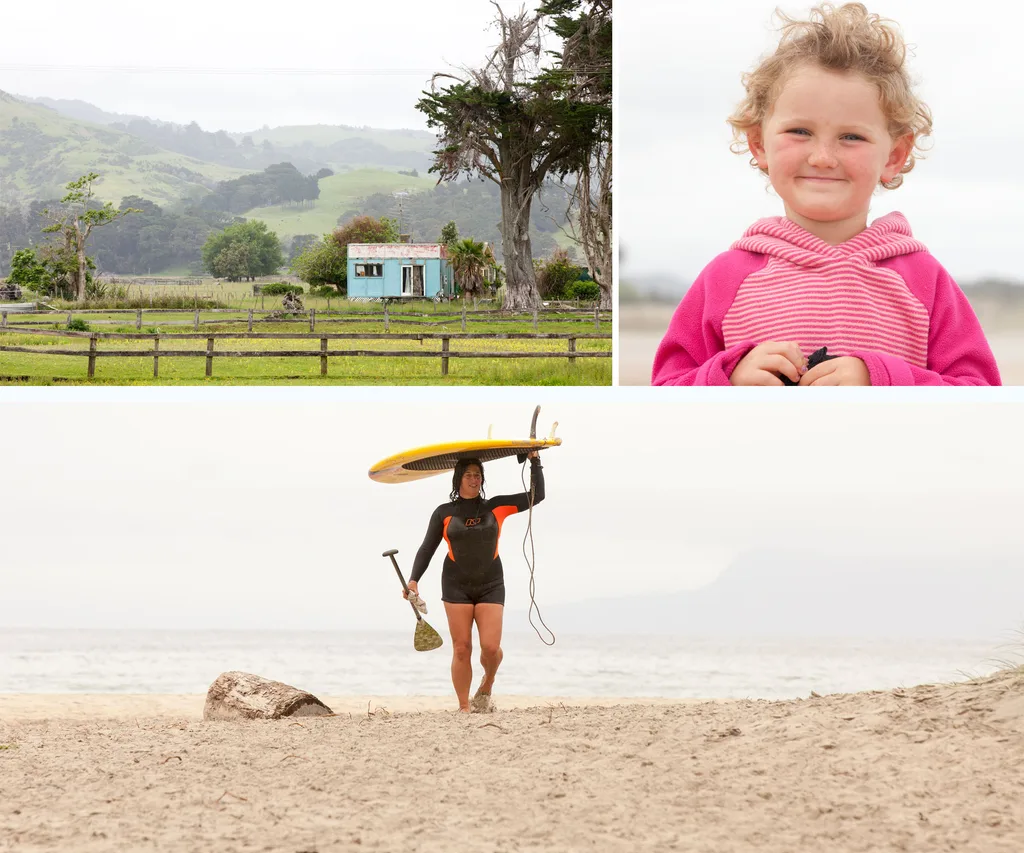
Above: Suzy Maddox comes in from the surf. Top right: Calla Shears plays on the sand. The water at Pakiri is crystal clear, but signs warn there can be dangerous rips. Over summer, the beach is patrolled by volunteer lifeguards.
Jo immigrated to New Zealand with her English husband, Cliff, who’d caught her eye one weekend at a holiday park in Kent. “On the Tuesday, a letter and a box of chocolates arrived. He thought I was the cat’s biscuits!”
One summer, they spent a couple of weeks at Pakiri with their two young daughters. That was 45 years ago, when the campground first opened, and they’ve been coming ever since. After Cliff retired, they drove up from Auckland every fortnight. He’d get up to go fishing at 4am. When he died three years ago, she decided to keep coming in his memory. Round here, everyone calls her Nana Jo. “We all get on,” she said. “Some people get a bit crabby, but you always have that in a neighbourhood.”
There was a frilled lampshade in one corner of the caravan, a transistor radio, a crocheted blanket on her bed. The table was piled with photo albums, filled with blue skies and bronzed, beaming children holding freshly caught fish. The sand dunes used to be so high you could slide down them on toboggans.
We shared a lunch of cheese and tomato sandwiches, and Nana Jo sent me on my way. As I headed up the hill towards Auckland, I heard a beep. My cell phone had come back into range.
Words by: Joanna Wane
Photos: Ken Downie
